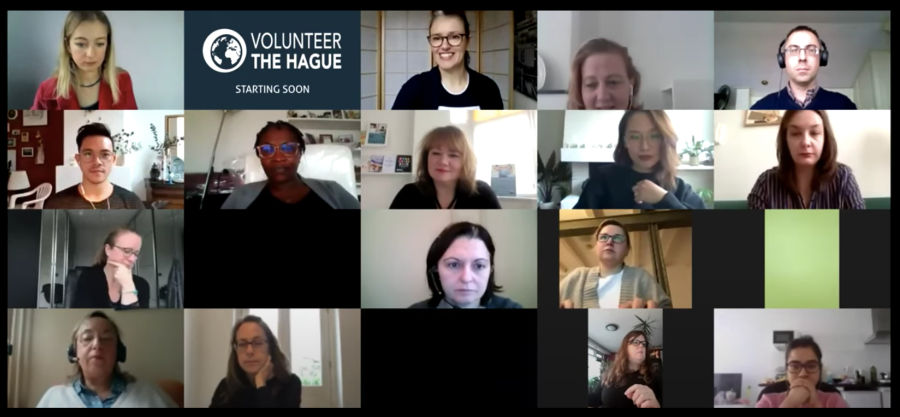Post | November 2020 | Past webinars | 3 min read
24 November 2020 - "How to Avoid (Another) Burnout - A Mental Health Workshop"

On Thursday, 24 November, VTH hosted our 5th free webinar of 2020 - a mental health workshop focused on preventing burnout! With over 150 attendees, it's clear that this was a topic that resonated with a lot of people, which is no surprise considering how hard 2020 has been for most of us. We were joined by long time friend of VTH Vassia Sarantoplou of the counseling and support organization Antiloneliness. During the hour-long workshop, Vassia walked us through the many reasons people experience burnout, the effects of burnout on our mental health, and ways to change our thinking in order to prevent burnout before it starts.
.png)
Vassia explained that burnout is a state that results from chronic stress that hasn't been managed, leading to profound exhaustion, worry, a sense of cynicism and apathy, and feelings of reduced productivity and personal fulfilment. If this sounds like anxiety or depression, you're right; burnout shares many characteristics with both. And like anxiety and depression, burnout isn't confined to our brains because it tends to manifest physically as well. Headaches, gastrointestinal distress, sleep disorder, and many other symptoms are common physical signs of burnout. And there are behavioral changes too, including relationship issues with those close to us, increased aggression, indecision, and procrastination.
.png)
Burnout is the result of a host of factors that are seemingly contractory. For example, both a high workload at a job you love and the monotony of a job you don't can lead to burnout. Lack of social support - personally and professionally - is also a key factor. But we can also bring burnout upon ourselves through harmful thinking, such as low self-esteem, a high sense of perfectionism, little exercise, no self care or reflection, and a consistent feeling of no control. And as you can see from the graphic to the right, burnout is a gradual process; there are stages that can help us identify it as it is happening to us. Some early signs can include overwhelming feelings such as lack of concentration, withdrawal, feeling overwhelmed by lack of time to complete tasks, increased time on the internet or social media, and difficulty saying no to tasks you don't want to (or can't) complete.

.png)
Of the many causes, Vassia focused a lot on perfectionism, pointing out that external behaviors that seem positive (overly hardworking, extremely detail-oriented and efficient, hyper-resilience without complaint, etc.) often mask inner turmoil (fear of failure, imposter syndrome, unhealthy overanalyzing, lack of boundaries). These feed our inner-critic and exacerbate all of the unhealthy thoughts and behaviors that contribute to burnout: hyper-achievement mentality, controlling behavior, restleness, worry and paronoia, and avoidance.
If some of these characteristics sound like you, you're not alone. Many people at the webinar expressed feelings of identification with many of these behaviors. But what's the solution? Vassia pointed out that the opposite of stress isn't "no stress." Rather, it's the ability to see negative thoughts and the scary scenarios our minds create and balance them with healthier, helpful, and more realistic thinking. This prevents us from going into the downward spiral shown below that leads to a state of burnout. You can understand your own way of thinking and root out negative patterns of thought by asking yourself honestly some key questions: How do you see failure? What do you think of others when they make mistakes? Where have I acquired these beliefs about success and failure? What would I say to a friend who is struggling or has failed in a task? Being aware of these patterns of thought, as well as self-care (good nutrition, good sleeping habits, exercise, and a strong effort to balance work, play, and life) will help prevent burnout before it starts. This is all a process, and to be successful requires regularly checking in with yourself.
We want to thank Vassia for giving us some great information at this webinar and giving us a lot to think about as we head into the new year. If you're interested in learning more about what Vassia does, or are interested in looking at her wonderful presentation slides, she welcomes people to contact her by email here.
About the Presenter
.jpg)
Vassia Sarantopoulou is a psychologist, trainer, Mental Health Ambassador, and the proud founder and owner of AntiLoneliness, a company offering mental health services in both The Netherlands and internationally. She is trained in (Group) Schema Therapy and Emotionally Focused Therapy, among other approaches (such as CBT, ACT, CFT). She is also a member of the Dutch Institute for Psychologists (NIP).
Vassia's mission is to defeat loneliness and to help people connect with others and with themselves in a deep and meaningful way. Her motto is, “You are not alone; no one deserves that," and she is passionate about spreading the word on Love and Meaningful Connections through her media platforms, her workshops, and her counseling groups.



